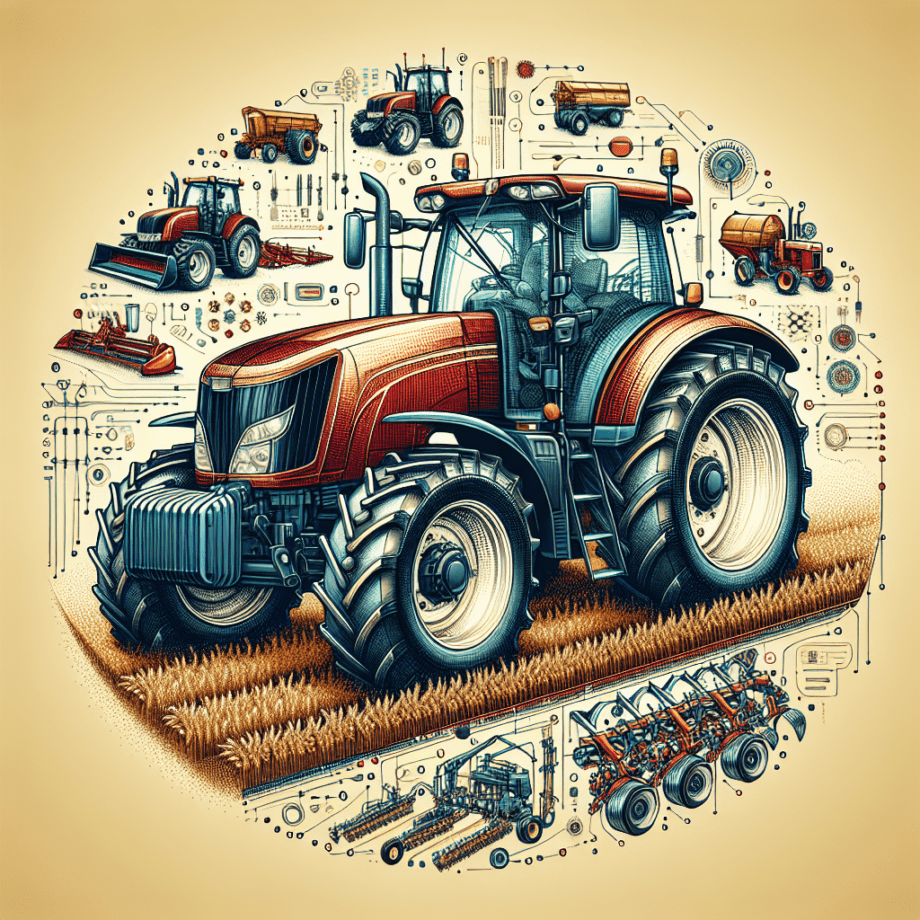Tractors have long been considered the backbone of modern farming, revolutionizing agricultural practices and significantly increasing productivity. These versatile machines have evolved over the years, incorporating advanced technologies to meet the growing demands of the agricultural industry. This article delves into the history, types, and technological advancements of tractors, highlighting their indispensable role in contemporary farming.
History of Tractors
The history of tractors dates back to the late 19th century when the first steam-powered tractors were introduced. These early machines were cumbersome and expensive, limiting their widespread adoption. However, the advent of the internal combustion engine in the early 20th century marked a significant turning point in tractor development.
Early Innovations
The first gasoline-powered tractor, developed by John Froelich in 1892, laid the foundation for modern tractors. This innovation was followed by the introduction of the Fordson tractor by Henry Ford & Son in 1917, which became the first mass-produced tractor. The Fordson tractor’s affordability and reliability made it immensely popular among farmers, leading to a rapid increase in tractor usage.
Post-War Advancements
After World War II, the agricultural industry witnessed significant advancements in tractor technology. The introduction of diesel engines, power take-off (PTO) systems, and hydraulic lifts enhanced the efficiency and versatility of tractors. These innovations allowed tractors to perform a wide range of tasks, from plowing and planting to harvesting and transporting goods.
Types of Tractors
Tractors come in various types, each designed to perform specific tasks and cater to different farming needs. Understanding the different types of tractors is crucial for selecting the right machine for a particular agricultural operation.
Utility Tractors
Utility tractors are versatile machines designed for general-purpose tasks on small to medium-sized farms. They are equipped with moderate horsepower engines and can be used for plowing, tilling, mowing, and transporting materials. Utility tractors are ideal for farmers who require a reliable and adaptable machine for various agricultural activities.
Row Crop Tractors
Row crop tractors are specifically designed for planting, cultivating, and harvesting row crops such as corn, soybeans, and cotton. These tractors feature adjustable wheel spacing, high ground clearance, and advanced steering systems to navigate between rows without damaging the crops. Row crop tractors are essential for large-scale farming operations that focus on row crop production.
Specialty Tractors
Specialty tractors are designed for specific agricultural tasks and environments. Examples include orchard tractors, which are compact and maneuverable for working in orchards, and vineyard tractors, which are narrow and low-profile for navigating between vineyard rows. Specialty tractors are tailored to meet the unique requirements of particular farming operations.
Technological Advancements in Tractors
The integration of advanced technologies has transformed tractors into highly efficient and intelligent machines. These technological advancements have significantly improved the performance, productivity, and sustainability of modern farming practices.
Precision Agriculture
Precision agriculture involves the use of GPS, sensors, and data analytics to optimize farming practices. Tractors equipped with GPS technology can perform tasks with pinpoint accuracy, reducing waste and increasing efficiency. For example, GPS-guided tractors can plant seeds at precise intervals, apply fertilizers and pesticides accurately, and harvest crops with minimal loss.
Autonomous Tractors
Autonomous tractors represent the future of farming, with the potential to revolutionize agricultural operations. These self-driving machines use advanced sensors, cameras, and artificial intelligence to navigate fields and perform tasks without human intervention. Autonomous tractors can work around the clock, increasing productivity and reducing labor costs. Additionally, they can operate in challenging conditions, such as extreme weather or rough terrain, where human operators may struggle.
Telematics and IoT
Telematics and the Internet of Things (IoT) have enabled real-time monitoring and management of tractors and other agricultural machinery. Telematics systems collect data on tractor performance, fuel consumption, and maintenance needs, allowing farmers to make informed decisions and optimize their operations. IoT devices can also connect tractors to other farm equipment, creating a seamless and integrated farming ecosystem.
Environmental Impact and Sustainability
As the agricultural industry faces increasing pressure to adopt sustainable practices, tractors play a crucial role in minimizing environmental impact. Modern tractors are designed to be more fuel-efficient and produce fewer emissions, contributing to a reduction in the carbon footprint of farming operations.
Fuel Efficiency
Advancements in engine technology have led to the development of more fuel-efficient tractors. These engines consume less fuel while delivering the same or higher levels of performance, reducing operating costs and environmental impact. Additionally, the use of alternative fuels, such as biodiesel and ethanol, further enhances the sustainability of tractors.
Soil Health
Tractors equipped with advanced tillage and planting systems can help maintain soil health by minimizing soil compaction and erosion. Precision agriculture techniques, such as no-till farming and cover cropping, can be implemented using modern tractors, promoting soil conservation and improving long-term agricultural productivity.
Conclusion
Tractors have undoubtedly become the backbone of modern farming, driving significant advancements in agricultural productivity and sustainability. From their humble beginnings as steam-powered machines to the sophisticated, technology-driven tractors of today, these versatile machines have continually evolved to meet the changing needs of the agricultural industry. As technology continues to advance, tractors will play an even more critical role in shaping the future of farming, ensuring that the industry can meet the growing demands of a rapidly expanding global population.
